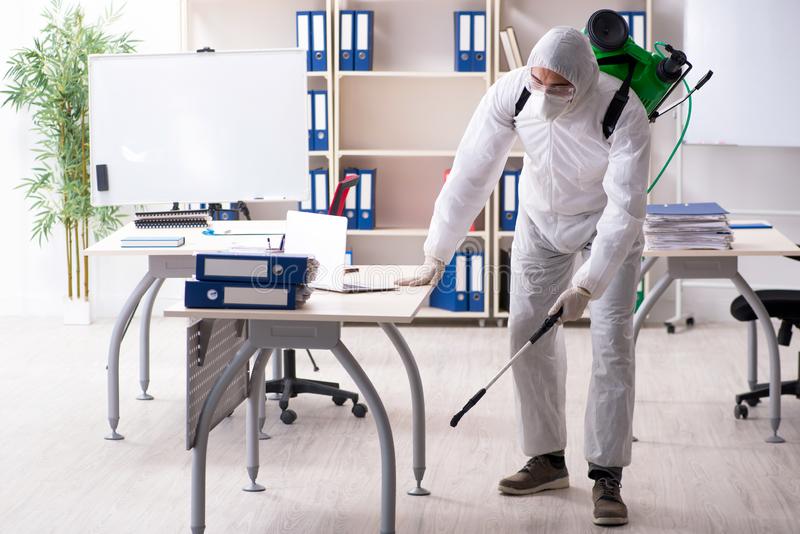An organization’s responsibility is to provide a healthy and safe work environment free of pests by doing pest control in the workplace that may contribute to the spread of disease and germs. Most office buildings that lease space to those businesses are responsible for pest control in common areas, while individual offices are likely the responsibility of the tenant. Either way, when a pest problem breaks out, it is the responsibility of both parties to ensure that the building is safe to work in for employees and for visiting customers & clients.
Importance of Pest Control
Pests are a problem that needs to be tackled by pest control. It can get out of hand if not dealt with in time. They are a major nuisance for offices. They can cause distractions and result in the loss of productivity. There are a wide range of pests that can infest an office setting, from rodents to cockroaches. These pests can come in through open windows and doors or be brought in by visitors. Pests also have the potential to bring diseases into the building, causing illness among employees, clients and visitors
Pests can cause diseases, damage food sources, and contaminate water supplies. They can also make living spaces uncomfortable with their noise and smells. As a result, the quality of life at work can deteriorate quickly. For these reasons and more, pest control is necessary for any office environment.
Common Pests in the Workplace
Pests infestation can be a huge problem in any office building. They feed on the food and papers that are left out, and they can cause allergic reactions to those who are sensitive to their saliva or droppings. There are a number of different pests you might encounter, but some of the most common in an office building are as follows:
Fruit Flies – These insects use ripe fruits and vegetables, organic food scraps, and sweet liquids as food. They are frequently observed floating near sinks, trash, and leftover food.
Fungus Gnats – Although they often originate from neighbouring overwatered plants, fungus gnats frequently hover around light screens.
Pantry Pests – Typically, dry goods like grains, cereals, nuts, etc. are infested by these pests. They might have come from tainted food.
Ants – Ants frequently enter in quest of food and water or to flee unpleasant weather outside. Once food is located, scout ants will leave pheromone trails for other ants to follow.
Cockroaches – These nocturnal insects can enter almost any space and are attracted to rubbish and clutter. They pose a health risk since they can transfer viruses and act as a disease vector.
Rodents – If it means getting food, pests like rats and mice can chew their way into the majority of places they can’t. Offices that are deserted in the evening are ideal for these nocturnal critters to rummage around since they will lay their eggs wherever food is available.
Benefits of Pest Control
Pest control in offices is a necessary process to ensure that the environment is safe for employees. When pests are allowed to roam free, they can cause structural damage and spread diseases. There are many benefits to pest control, including the following:
Protection Every Day & Night – You may rest easy knowing your property is secured because integrated pest management will continuously monitor pest activity.
Protecting Valuable Assets – By chewing through cables and shorting out circuits, pests can seriously harm IT systems. In order to lessen the likelihood of that occurring, make sure you have pest prevention and monitoring techniques in place.
Minimizing Costs – When cleaning and repair costs associated with bug and rodent damage are taken into account, proactive pest control methods end up saving a significant amount of money.
Staff Safety & Health – Keeping the workplace pest-free helps prevent workplace pathogens and viruses from spreading.
Discretion – Expert pest control technicians identify and resolve problems quickly and discreetly.
Brand Name Protection – Inevitably, pest issues manage to harm a workplace’s and a company’s reputation in the eyes of both staff members and clients. Professional pest control services guarantee a pest-free environment, ensuring that there are never any pest issues.
Image Credits: https://www.dreamstime.com/photos-images/pest-control-office.html
Frequently Asked Questions
Q. How can pest control help to reduce the risk of an office being infested with pests?
A. Pest control is a method that can be used to reduce the risk of an office being infested with pests. There are different types of pest control methods that professional pest control companies provide. They will also help to keep your workplace clean and healthy, which will be good for employees and customers alike.
Q. Why should we use a professional pest control service for an office?
A. A professional pest control service will be able to identify the problem and provide a solution that is tailored to the specific needs of your office. The professionals will also be able to identify where the pests are entering, which is vital for tackling the infestation. Pest control services can also provide a maintenance plan for your property, which can help you to prevent future infestations.
Q. How often should pest control be done in offices?
A. The frequency of pest control varies depending on the type of pests that are present, their activity level and the number of people in the building. The most common pests include cockroaches, ants, silverfish, spiders and mice. For example, if your office has cockroaches, then you should consider pest control every 2-4 weeks or even more often if needed.

